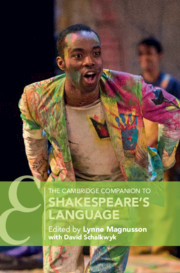Book contents
- The Cambridge Companion to Shakespeare’s Language
- The Cambridge Companion to Shakespeare’s Language
- Copyright page
- Contents
- Contributors
- Preface
- Abbreviations
- Part I Basic Elements
- Part II Shaping Contexts
- Part III New Technologies
- Part IV Contemporary Sites for Language Change
- 12 Writing for Actors: Language that Cues Performance
- 13 Language and Translation
- 14 Popular Culture and Shakespeare’s Language
- Appendix Glossary of Rhetorical Figures
- Further Reading
- Select Bibliography
- Index
- Cambridge Companions to…
14 - Popular Culture and Shakespeare’s Language
from Part IV - Contemporary Sites for Language Change
Published online by Cambridge University Press: 01 July 2019
- The Cambridge Companion to Shakespeare’s Language
- The Cambridge Companion to Shakespeare’s Language
- Copyright page
- Contents
- Contributors
- Preface
- Abbreviations
- Part I Basic Elements
- Part II Shaping Contexts
- Part III New Technologies
- Part IV Contemporary Sites for Language Change
- 12 Writing for Actors: Language that Cues Performance
- 13 Language and Translation
- 14 Popular Culture and Shakespeare’s Language
- Appendix Glossary of Rhetorical Figures
- Further Reading
- Select Bibliography
- Index
- Cambridge Companions to…
Summary
In his discussion of speech act theory, Jacques Derrida argues that all language is subject to the principle of iterability, the capacity for language to be repeated in all sorts of new contexts.
- Type
- Chapter
- Information
- The Cambridge Companion to Shakespeare's Language , pp. 244 - 262Publisher: Cambridge University PressPrint publication year: 2019

